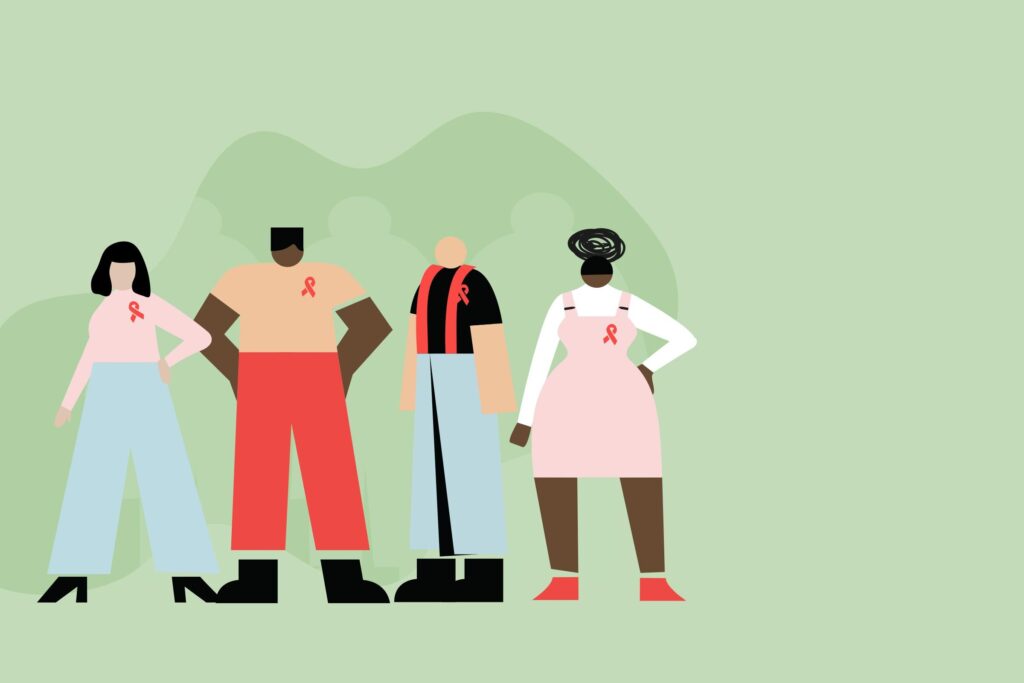Forget these 6 Myths About HIV
This World AIDS Day take a minute to make sure your understanding of HIV is up-to-date, so you can play a part in dispelling stigma and putting an end to the disease.
December 1st is World AIDS Day, an annual time to raise awareness of the ongoing HIV epidemic and recognize the 37 million+ people worldwide who live with HIV. In 1988 when World AIDS Day started a lot was still unknown about the virus, and some stubborn myths took hold among the public. Thankfully, research into HIV prevention and treatment has resulted in major, life-saving breakthroughs since then, but you may not realize exactly how much has changed. To make sure you have accurate information, make sure you know your myths from your facts.
Myth: HIV Can Be Transmitted Through Kissing
HIV is not transmitted via toilets, sharing drinks, food, coughing, saliva, kissing, or sweat according to the CDC.
Myth: HIV is Only Transmitted During Ejaculation
Pre-ejaculation, often referred to as pre-cum, contains the virus. Pre-ejaculate is released before ejaculation, sometimes much sooner. Always use condoms before intimate contact occurs.
Nurx offers PrEP for HIV prevention for as little as $0 with insurance for medication.
Myth: It’s Not Safe to Have Intimate Contact With Someone With HIV
The combination of condoms and the medication PrEP provides very good protection against contracting HIV from a sexual partner. And if an HIV positive person is taking HIV medication and the virus is “undetectable” in his or her body, then the virus cannot be spread to a partner. The fact that undetectable means untransmittable is referred to as U=U.
Myth: HIV is AIDS and AIDS is HIV
HIV (human immunodeficiency virus) is a virus, whereas AIDS (acquired immunodeficiency syndrome) describes a health condition that can develop after many years if HIV is left untreated. HIV doesn’t progress to AIDS until the immune system becomes compromised, at which point the person with AIDS becomes vulnerable to certain infections and forms of cancer. With medical treatment it’s very possible to live with HIV without ever developing AIDS. In fact, many HIV experts in the US no longer use the term “AIDS” because of the fear and stigma associated with it.
Myth: You Don’t Need HIV Testing Unless You Know You’re At-Risk
If you’re sexually active and don’t know for certain that your partners are HIV-negative you should be tested regularly for HIV and other sexually transmitted infections — at least once a year, and more often if you are at high risk. According to the CDC about 1 in 7 people in the US who are HIV positive don’t know their status, which underlines the importance of regular testing. You can get a status check from home with an STI Home Test Kit.
Myth: HIV is a Death Sentence
Although there’s still no cure for HIV, modern medications allow people to live long and healthy lives with HIV, without passing the virus to sexual partners. Often the treatment is as simple as a single daily pill. While researchers continue to look for a cure for the virus, we can be grateful for the life-saving advances that have been made in HIV prevention and treatment.
Hopefully dispelling these myths has helped you understand that HIV and AIDS don’t deserve the stigma that is still associated with them. While ending HIV should be a global imperative
This blog provides information about telemedicine, health and related subjects. The blog content and any linked materials herein are not intended to be, and should not be construed as a substitute for, medical or healthcare advice, diagnosis or treatment. Any reader or person with a medical concern should consult with an appropriately-licensed physician or other healthcare provider. This blog is provided purely for informational purposes. The views expressed herein are not sponsored by and do not represent the opinions of Nurx™.





